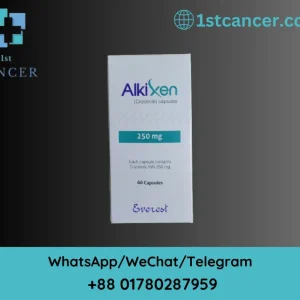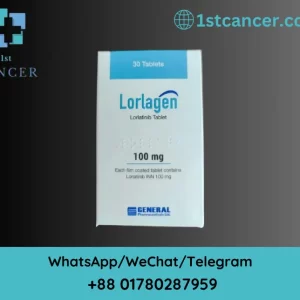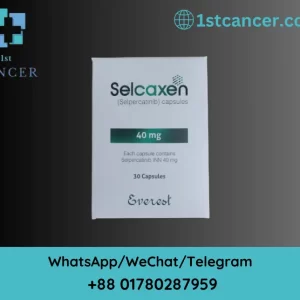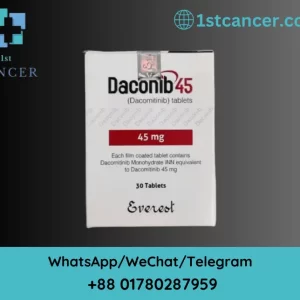Osimertinib: Advanced Targeted Therapy for Non‑Small Cell Lung Cancer
Osimertinib, marketed by General Pharmaceutical LTD, is a cutting‑edge, third‑generation epidermal growth factor receptor (EGFR) tyrosine kinase inhibitor specifically designed to treat non‑small cell lung carcinomas (NSCLC) with distinct EGFR mutations. Ideal for both locally advanced and metastatic disease states, this targeted therapy provides a promising approach for patients whose tumours harbour mutations such as T790M, exon 19 deletions, or exon 21 L858R.
Medical Uses and Regulatory Approvals
- Precision Treatment: Osimertinib is administered when NSCLC is driven by activating EGFR mutations or the T790M resistance mutation, whether detected before treatment or acquired following first‑line EGFR TKI therapy (e.g., gefitinib, erlotinib, or afatinib). Companion diagnostic tests, like FoundationOne CDx, are used in the United States to identify these mutations.
- FDA & EMA Milestones:
- United States: Approved in November 2015, with subsequent approvals expanding its use. In February 2024, the FDA approved osimertinib in combination with platinum‑based chemotherapy for patients with EGFR exon 19 deletions or exon 21 L858R mutations. Later, in September 2024, it earned approval for adults with unresectable stage III NSCLC who have not progressed during or after platinum‑based chemoradiation therapy.
- European Union: Received approval in February 2016 under an accelerated review process.
Mechanism of Action and Pharmacology
- Targeted Binding: Osimertinib works by irreversibly binding to mutated EGFR proteins, effectively inhibiting their activity. This prevents the growth and survival signals of cancerous B cells, slowing tumour progression.
- Pharmacokinetics:
- Peak Concentration: Achieved within 6 hours (range: 3–24 hours).
- Half‑Life: Approximately 48 hours allows convenient once‑daily dosing.
- Elimination: About 68% is eliminated via faeces and 14% via urine, supporting its linear pharmacokinetic profile.
- Managing Resistance: Although resistance typically emerges within ten months, often through the exon 20 C797S mutation, ongoing research is focused on developing new inhibitors to target additional regions of the EGFR kinase domain.
Adverse Effects and Interactions
- Common Side Effects: Most frequently reported adverse events include:
- Diarrhea
- Rash and dry or itchy skin
- Musculoskeletal pain
- Inflammation around nails
- Sore mouth, fatigue, and cough
- Drug Interactions:
- Osimertinib is metabolised by CYP3A4 and CYP3A5, so drugs that inhibit these enzymes (like certain macrolide antibiotics, antifungals, and antivirals) may increase its exposure, whereas enzyme inducers like rifampicin could reduce its effectiveness.
- Safety Considerations: Caution is advised during use, especially among populations at risk for fetal harm.
Chemical and Formulation Details
- Formulation: Provided as a mesylate salt.
- Molecular Properties:
- Chemical Formula: C28H33N7O2·CH4O3S
- Molecular Weight: 596 g/mol
History and Development
- Discovery: The program to develop osimertinib commenced in 2009, aiming to discover a third‑generation EGFR inhibitor that selectively targets the T790M mutation. The drug was successfully pinpointed in 2012 as a structure‑driven therapy.
- Breakthrough Therapy Designation: In April 2014, based on outstanding phase I trial results, osimertinib was designated as a breakthrough therapy and received accelerated approval by the FDA in November 2015.
- Global Impact: With its subsequent provisional approval in Europe in February 2016 and its recent approvals for new combinations and indications, osimertinib stands as a critical advancement in the treatment of EGFR-mutated NSCLC.
Conclusion
Osimertinib marks a significant leap forward in targeted lung cancer therapy. Its ability to specifically attack mutated EGFR proteins, combined with its well-characterised safety profile and robust clinical evidence, makes it an essential option for patients battling advanced NSCLC. Whether used alone or in combination with chemotherapy, osimertinib continues to redefine the standards of care in oncological treatment.





